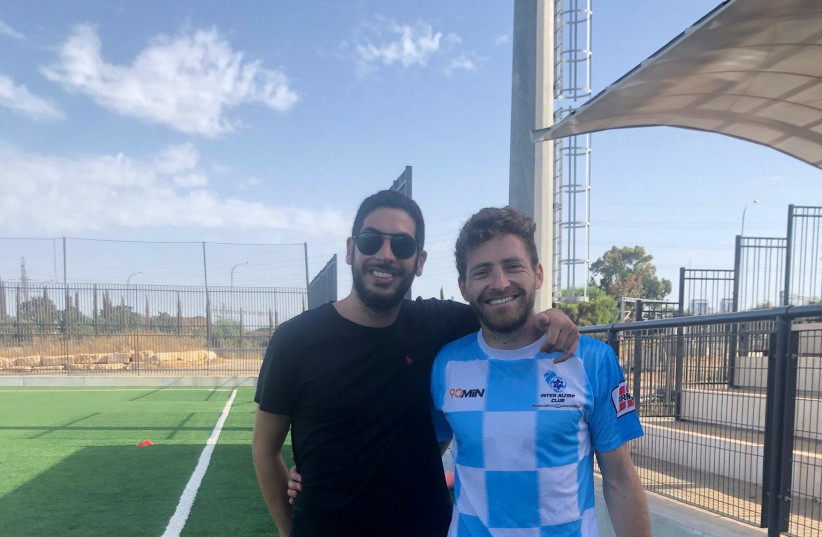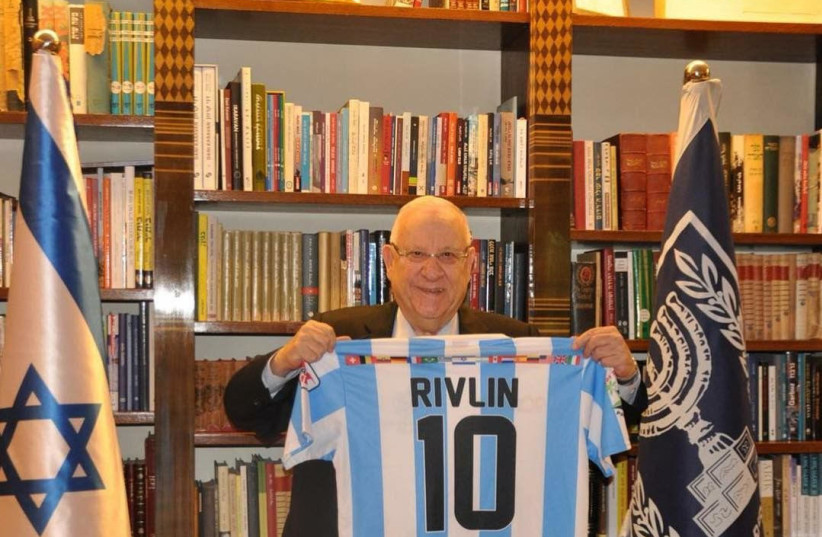Sam Sank moved to Israel from London at 18, served in the paratroopers as a lone soldier, studied politics, began a career in hi-tech, and – unlike so many other young immigrants he knew – has remained in Israel.
“Purely from a Zionist perspective, I always felt that Israel was my home from afar,” he says.
 Learn how to buy your home in Israel with confidence
Learn how to buy your home in Israel with confidenceAlthough that sentiment was shared by the other 18 people who made aliyah with him as part of the Garin Tzabar program – which facilitates Israel Defense Forces service and communal support for Jews from abroad without parents in Israel – 12 of them ended up back where they came from.
“Olim often find it difficult in Israel. There are lots of cultural barriers, language barriers, social barriers,” says Sank, now 31.
“Sports is one of the many ways that can help people integrate into Israel. It gives them that crucial network and support. And that was the basis of why we started Inter Aliyah,” a semi-professional soccer club with exclusively immigrant players.

The cleverly named club combines Sank’s Britain-bred passion for soccer with his Zionist-bred passion for helping other émigrés find a permanent place in Israeli society.
Soccer, says Sank, “is part of the English mentality, and has been in my life from day one. After finishing the army, I wanted to play football again and was introduced to an amateur league here in Israel that still exists. And there were a lot of olim playing in that league.”
He and a few colleagues at sports media company 90min (now called Minute Media) formed their own team and played in that amateur league for around two years.
“It was just a team of friends. There was no ideology or project behind it. But then in the summer of 2016, Ricardo Horvath made aliyah from Ecuador and was introduced to the team. Ricky and I, along with five other olim, some of whom work for Minute Media, decided to create Inter Aliyah,” says Sank.
Inter Aliyah
Inter Aliyah provides an opportunity for new immigrants to play serious soccer while also assisting them in the absorption process, thanks to partnerships with Nefesh B’Nefesh, CrossFit Tel Aviv and Minute Media.
As an official league of the Israel Football Association, Inter Aliyah also created a not-for-profit organization so that it can be supported by donations. Today, the league’s 10 sponsors include media and hi-tech companies such as Wix and Pixellot, as well as The Sports Rabbi and Keep Olim, a grassroots group dedicated to helping immigrants make it in Israel.
“The idea, in general, was to build this football team and see it develop over the years, and eventually become a professional team that competes in the highest level of Israeli football,” says Sank.
About 40 nationalities are represented on Inter Aliyah teams, making it a fan focus for the Diaspora.
“There truly is a niche market that is being missed out on by a lot of the sports teams here in Israel. You have your Maccabis and your Poels and your Betars, which are focused obviously on Israelis. But if you go to the Jewish community in France, or the Jewish community in South Africa, and you ask them ‘Which Israeli soccer team do you support?’ there is no affinity to a certain team because none of those teams represent Diaspora Jews. And that’s where we come in,” says Sank.
“We have South Africans, French, Belgians, Ecuadorians, Uruguayans, Ethiopians, Russians and every nationality you can think of. Just in the men’s football team, the original team which still exists to this day, there are 10 nationalities.”
In addition to the UK and Ecuador, the league’s founders come from Germany, Brazil and Peru. Illustrating Sank’s point about how hard it is for young internationals to build a successful life in Israel, three of the founders no longer live here.
Nevertheless, “because we represent all these nationalities, we’re promoting aliyah and we’re strengthening that bond between Israel and the Diaspora – something that other clubs are not doing,” says Sank.
The league has expanded from the original men’s soccer team, which plays in the IFA’s Fifth Division, to two additional men’s soccer teams in an amateur league, as well as a women’s soccer team, a professional basketball team, and an amateur basketball team.
“Overall, it’s about 200 olim athletes who are involved in our almost daily activities,” says Sank.
“But the community goes beyond those 200 athletes, because it includes friends and family, probably about 1,000 people altogether. When new olim want to play football or basketball, a lot of them already have heard about Inter Aliyah, which makes sense because so many nationalities are represented and we have players or alumni in almost every city.”
Sank, who serves as the non-paid chief marketing officer for Inter Aliyah as a sideline to his full-time career, says Inter Aliyah is “the most marketed Fifth Division team in the history of Israeli soccer. We have a picture of [former president Reuven] Rivlin holding our shirt. You know, I don’t think many other Fifth Division teams can say they’ve had that.”

ASHER GOLDBERG, a friend of Sank’s who made aliyah from London last October, plays on the first team. Although that requires him to train twice a week and play a game once a week, on top of working in hi-tech, he says it’s worthwhile.
“I’d do it every day if I could,” says Goldberg. “Firstly, I’m very passionate about playing and watching football, and secondly it’s given me a really nice structure for meeting people from all over the world, who are very understanding of the trials and tribulations of aliyah.
“There’s always a good vibe, lots of smiles, and a very family-kind of atmosphere. I am without my family here so to feel part of something has been really great.”
Alison Mervish, another London émigré, started playing on the women’s team in 2020, four years after she made aliyah.
“I heard of the team through a friend of mine, Matt Keston, who runs some of the men’s teams. I have always loved playing football but hadn’t played since I was about 16 when I left school. I heard about the women’s team and wanted to give it a try, as I always had fun when playing. It’s a great social, as well as exercise, opportunity.”
Inter Aliyah has become well organized, with an application people can use to register and pay for activities, a WhatsApp group and an increasing number of partnerships and sponsorships.
“It’s all based on donations, so we’re always looking for those individuals who have some kind of connection to sport or olim and want to support a project like this,” says Sank.
Looking ahead to the league’s seventh season starting in September, he wants to expand further, forming teams in additional cities including Jerusalem, and branching into additional sports such as rugby, hockey, lacrosse and volleyball.
“The infrastructure we built is quite easy to be replicated, which is how we saw such crazy success in basketball so quickly,” says Sank. “The basketball team has only been in existence one year and already they finished second in their league and may be promoted to the Fourth Division within another year.”
Inter Aliyah also has become a resource for immigrants seeking professional connections and recommendations as well as employment, with its own job network set up on Facebook.
Sank’s long-range plan is to secure land to build an Inter Aliyah campus, “to have everything in house – football pitches, basketball courts, gyms – and sleeping facilities to become a sort of absorption center for sportspeople from other countries. Maybe there’s some possibility of working with the Aliyah and Integration Ministry, so that this will be an option available to olim.”
In the next decade, Sank hopes Inter Aliyah will be helping to integrate more and more immigrants.
“We’re already connecting people with jobs and apartments and whatever they need. But the idea is to have it all in one place, like a real hub. Obviously, a lot depends on the logistics and the finances, but as Herzl said, if you will it, it is not just a dream. We’ve achieved so much already in six years. I don’t see why we can’t achieve what we dream of in 10 years’ time.” ■
 Sign up for our newsletter to learn more
Sign up for our newsletter to learn more 